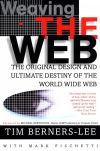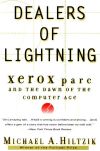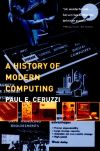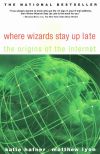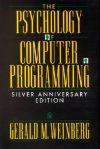Saturday, June 14, 2003
Just Computer Books
Recently I added some computer-related books to the left-hand menu, for which I’d get a small percentage if you buy them (at the same price). Here I’d like to give a small introduction to computer books I read and liked.
Weaving the Web - The Original Design and Ultimate Destiny of the World Wide Web
This is the whole story of the invention of the World Wide Web (WWW, HTTP, Hyperlinks, HTML) by the man
who invented it, Tim Berners-Lee. Also, the second half of the book talks about the future of the Web, and XML/Semantic Web
specifically. While the second half seems a bit confusing, the first one is really very, very interesting. You will see how a mere mortal computer user saw the need to somehow connect all the different documents to make sense of the information jungle he found at the CERN in Geneva. After publishing the standards the whole thing takes off in amazing time, and we can later see key-players appear. Like the guy who did Netscape. It’s remarkable how this thing, the Web, simply wasn’t there two decades ago, and yet today we can hardly imagine how we’ve got along without it before.
So if you want to get a better sense of where you are when you’re on the Web, and how this whole thing came into being, I suggest you read the book by this very modest author.
Hackers - Heroes of the Computer Revolution
This book by Steven Levy is a complete classic, incredibly interesting & inspiring. I’m biased because I’m interested in the topic, and read many “hacker history” books, but this one is still the best. The scope of “hacking” is quite broad, and we get to know the inventors of early computer technology, as opposed to just the let’s-see-what’s-hidden-in-the-Pentagon teens (which seem to be the main focus whenever media starts talking about hackers).
Dealers of Lightning - Xerox PARC and the Dawn of the Computer Age
I read so many references before to either that “Microsoft stole their Windows design from Apple”, or “Apple stole from Xerox PARC in the first place”, that I felt like buying this book. (And being an Amiga-user originally, I knew I could live with either truth.)
In Dealers of Lightning,
Michael A. Hiltzik tells the story of the Xerox PARC (Palo Alto Research Center) R&D think-tank which gathered some of the greatest computer minds and invented many of the desktop-publishing
and networking solutions in use today — back in the 1970s. Like, a windows-based Operating System. Laser-printing. Or many of the desktop metaphors that later made it into the Apple computers — and indeed, Steve Jobs got a free tour through Xerox PARC). Or WYSIWYG text-editing. The book is very detailed, starts a bit too slow for me (and focussing a little too much on the management/ business side), but it becomes so interesting later that it’s all worth it.
A History of Modern Computing
Starting with the 1945 ENIAC computer, Paul E. Ceruzzi covers all the machinery and technologies. A great introduction to computing.
Where Wizards Stay Up Late - The Origins of the Internet
(By Katie Hafner.) What can I say, the history of the Internet, and probably the best one at that! You will even find out how the “@” character was chosen for emails. This is a fascinating read.
Trigger Happy - Videogames and the Future of Entertainment
Author Steven Poole writes about the video game history, every chapter covering a certain
genre. The approach is very serious and philosophic, with deep analysis of certain video games.
Having read some computer game history books & analysis books before I knew many of the anecdotes.
However if you don’t know much about Pac-Man and all the others and want to find out,
this should definitely be worthwhile.
What I don’t like about the book is that it lists many games which might have been
hot at the time of writing, but which don’t seem to timeless, while leaving out some classics; also, it sometimes gets a litte pseudo-theoretical and wordy.
While this might not become the definite video-games-as-art bible, it’s a good start, and might be the best we have on the subject. And even though I found it an interesting read, it’s the only book of this selection which I can’t whole-heartedly suggest, so you better check some more reviews yourself and see wether you might like it. Especially, you might want to check into the truly incredible Game Over by David Sheff; even though it’s set out to be “only” a history of Japanese Nintendo, it’s much more timeless.
The Psychology of Computer Programming
Being a programmer myself, I found this book by Gerald M. Weinberg very fascinating. It might be even more interesting to non-programmers. This is a revised edition of an older programming classic, but not much had to be changed as it stood the test of time, focussing on the human psyche rather than certain program specifics.
>> More posts
Advertisement
This site unofficially covers Google™ and more with some rights reserved. Join our forum!

